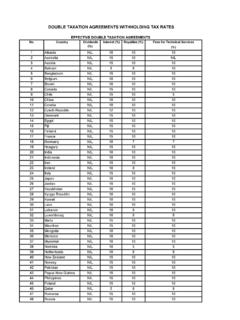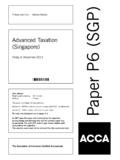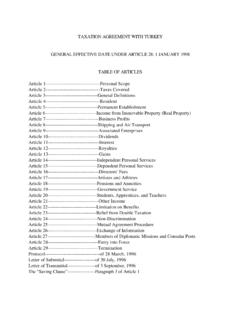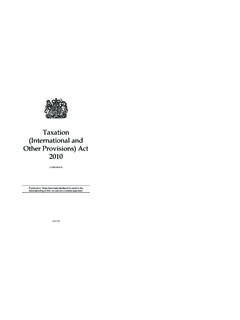Transcription of TAX CONVENTION WITH VENEZUELA GENERAL …
1 TAX CONVENTION with VENEZUELAGENERAL effective DATE UNDER ARTICLE 29: 1 JANUARY 2000 TABLE OF ARTICLESA rticle 1---------------------------------Genera l ScopeArticle 2---------------------------------Taxes CoveredArticle 3---------------------------------Genera l DefinitionsArticle 4---------------------------------Reside nceArticle 5---------------------------------Perman ent EstablishmentArticle 6---------------------------------Income from Immovable Property (Real Property)Article 7---------------------------------Busine ss ProfitsArticle 8---------------------------------Shippi ng and Air TransportArticle 9---------------------------------Associ ated EnterprisesArticle 10--------------------------------Divide ndsArticle 11--------------------------------Intere stArticle 11A------------------------------Branch TaxArticle 12--------------------------------Royalt iesArticle 13--------------------------------GainsA rticle 14--------------------------------Indepe ndent Personal ServicesArticle 15--------------------------------Depend ent Personal ServicesArticle 16--------------------------------Direct ors' FeesArticle 17--------------------------------Limita tion on BenefitsArticle 18--------------------------------Artist es and SportsmenArticle 19--------------------------------Pensio ns, Social Security, Annuities.
2 And Child SupportArticle 20--------------------------------Govern ment ServiceArticle 21--------------------------------Studen ts, Trainees, Teachers and ResearchersArticle 22--------------------------------Other IncomeArticle 23--------------------------------Capita lArticle 24--------------------------------Relief from Double TaxationArticle 25--------------------------------Non-Di scriminationArticle 26--------------------------------Mutual Agreement ProcedureArticle 27--------------------------------Exchan ge of InformationArticle 28--------------------------------Diplom atic Agents and Consular OfficersArticle 29--------------------------------Entry into ForceArticle 30--------------------------------Termin ationLetter of Submittal---------------------of 1 June, 1999 Letter of Transmittal-------------------of 29 June, 1999 Protocol-------------------------------- --of 25 January, 1999 The Saving Clause -------------------Paragraph 4 of Article 1 MESSAGEFROMTHE PRESIDENT OF THE UNITED STATESTRANSMITTINGTHE CONVENTION BETWEEN THE GOVERNMENT OF THE UNITED STATES OFAMERICA AND THE GOVERNMENT OF THE REPUBLIC OF VENEZUELAFOR THE AVOIDANCE OF DOUBLE TAXATIONAND THE PREVENTION OF FISCAL EVASION with RESPECT TO TAXES ONINCOME AND CAPITAL, SIGNED AT CARACAS ON JANUARY 25, 1999 LETTER OF SUBMITTALDEPARTMENT OF STATE,Washington, June 1, PRESIDENT,The White House.
3 THE PRESIDENT: I have the honor to submit to you, with a view to its transmission to theSenate for advice and consent to ratification, the CONVENTION Between the Government of theUnited States of America and the Government of the Republic of VENEZUELA for the Avoidanceof Double Taxation and the Prevention of Fiscal Evasion with Respect to Taxes on Income andCapital, together with a Protocol, signed at Caracas on January 25, 1999 ("the CONVENTION "). This CONVENTION will be the first such CONVENTION between the United States of America andthe Republic of VENEZUELA . This CONVENTION generally follows the pattern of the 1996 Tax CONVENTION while incorporating some provisions found in recent tax treaties betweenthe United States and developing nations. It provides for maximum rates of tax to be applied tovarious types of income, protection from double taxation of income, and exchange ofinformation, and it contains rules making its benefits unavailable to persons who are engaged intreaty shopping.
4 The proposed withholding rates, while in some respects higher than those in Model, are the same as those in other treaties with developing countries and otherVenezuela tax treaties. Also, the withholding rates reflect VENEZUELA 's territorial system oftaxation and the objective of establishing an adequate single level of tax on cross-borderinvestment income. Like other tax conventions, this CONVENTION provides rules specifyingwhen income that arises in one of the countries and is attributable to residents of the othercountry may be taxed by the country in which the income arises (the "source" country). Pursuant to Article 10, dividends from direct investments are subject to tax by the sourcecountry at a maximum rate of five percent. The ownership threshold for direct investment is tenpercent, consistent with other modern tax treaties, in order to facilitate direct dividends are generally taxable at 15 percent.
5 Under Article 12, royalties for the use ofindustrial, commercial, or scientific equipment derived and beneficially owned by a resident of aContracting State are subject to tax at a maximum rate of five percent by the source country; allother royalties are subject to tax at a maximum rate of ten percent. Under Article 11 of the proposed CONVENTION , most interest arising in one Contracting Stateand owned by a resident of the other Contracting State is subject to taxation by the sourcecountry at a maximum rate of ten percent. However, interest income received by a financialinstitution (including an insurance company) is subject to tax at a maximum rate of percent,and interest earned on government debt and debt guaranteed by government agencies is exemptfrom taxation by the source country. The reduced withholding rates described above do not apply if the beneficial owner of theincome is a resident of one Contracting State who carries on business in the other ContractingState and the income is attributable to a permanent establishment or fixed base situated in thatother State.
6 If the income is attributable to a permanent establishment, it will be taxed as businessprofits, and, if the income is attributable to a fixed base, it will be taxed as a payment forindependent personal services. The maximum rates of withholding tax described in the preceding paragraphs are subject tothe standard anti-abuse rules for certain classes of investment income found in other taxtreaties and agreements The taxation of capital gains described in Article 13 of the CONVENTION follows the format ofthe Model. Gains and income derived from the sale of real property and from real propertyinterests may be taxed by the State in which the property is located. Likewise, gains or incomefrom the sale of personal property, if attributable to a fixed base or permanent establishmentsituated in a Contracting State, may be taxed in that State.
7 All other gains, including gains fromthe sale of ships, aircraft and containers, and gains from the sale of stock in a corporation, aretaxable only in the State of residence of the seller. Article 7 of the proposed CONVENTION generally follows the standard rules for taxation by onecountry of the business profits of a resident of the other. The source country's right to tax suchprofits is generally limited to cases in which the profits are attributable to a permanentestablishment located in that country. As do all recent treaties, this CONVENTION preservesthe right of the United States to impose its branch taxes in addition to the basic corporate tax on abranch's business. Under Article 8 of the proposed CONVENTION , income from the operation of ships and aircraftin international traffic and from the use, maintenance or rental of containers used in internationaltraffic is taxed in a manner consistent with the Model.
8 Article 8 permits only the country ofresidence to tax profits from the international operation of ships or aircraft, including profitsfrom the rental of ships and aircraft when the ship or aircraft is operated by the lessee ininternational traffic, or when the rental activity is incidental to the operation of ships or aircraftby the lessor. All income from the use, maintenance or rental of containers used in internationaltraffic is likewise exempt from source-country taxation under the proposed CONVENTION . The taxation of income from the performance of personal services under Articles 14 through16 of the New CONVENTION is essentially the same as that under recent treaties with somedeveloping countries but grants a taxing right to the host country with respect to such incomethat is broader than in the OECD or Model treaties. Article 17 of the proposed CONVENTION contains significant anti-treaty-shopping rules makingits benefits unavailable to persons engaged in treaty-shopping.
9 Rules necessary for administration, including rules for the resolution of disputes under theConvention and for exchange of information, are contained in Articles 26 and 27. The CONVENTION would permit the GENERAL Accounting Office and the tax-writing committeesof Congress to obtain access to certain tax information exchanged under the CONVENTION for usein their oversight of the administration of tax laws. This CONVENTION is subject to ratification. In accordance with the provisions of Article 29, itwill enter into force when the Governments notify each other through diplomatic channels thattheir constitutional requirements for entry into force have been met. It will have effect forpayments made or credit on or after the first day of January following entry into force withrespect to taxes withheld by the source country; with respect to other taxes, the CONVENTION willtake effect for taxable periods beginning on or after the first day of January following the date onwhich the CONVENTION enters into force.
10 The proposed CONVENTION will remain in force indefinitely unless terminated by one of theContracting States, pursuant to Article 30. At any time after five years from the date on whichthe CONVENTION enters into force, either Contracting State may terminate the CONVENTION as of theend of a calendar year by giving notice of the termination through diplomatic channels at leastsix months prior to the end of that calendar year. A Protocol accompanies and forms an integral part of the CONVENTION . The Department of the Treasury and the Department of State cooperated in the negotiation ofthe CONVENTION . It has the full approval of both Departments. Respectfully submitted,MADELINE OF TRANSMITTALTHE WHITE HOUSE, June 29, the Senate of the United States: I transmit herewith for Senate advice and consent to ratification the CONVENTION Between theGovernment of the United States of America and the Government of the Republic of Venezuelafor the Avoidance of Double Taxation and the Prevention of Fiscal Evasion with Respect toTaxes on Income and Capital, together with a Protocol, signed at Caracas on January 25, transmitted is the report of the Department of State concerning the CONVENTION .
















